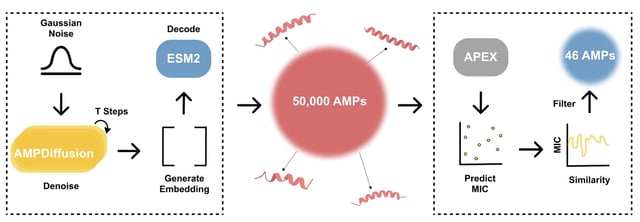Overview
- A Cell Biomaterials study unveils AMP-Diffusion, a University of Pennsylvania tool that creates antimicrobial peptide candidates de novo.
- The system generated roughly 50,000 sequences, with APEX 1.1 narrowing the set to 46 that were synthesized for laboratory and animal tests.
- In mouse skin-infection models, two peptides matched the efficacy of levofloxacin and polymyxin B with no adverse effects reported.
- Across assays, 76% of tested peptides killed bacteria, including multidrug-resistant strains, while showing low toxicity.
- Researchers describe the work as proof of principle and aim to steer designs toward drug-like properties as they address translation to real-world therapies.
